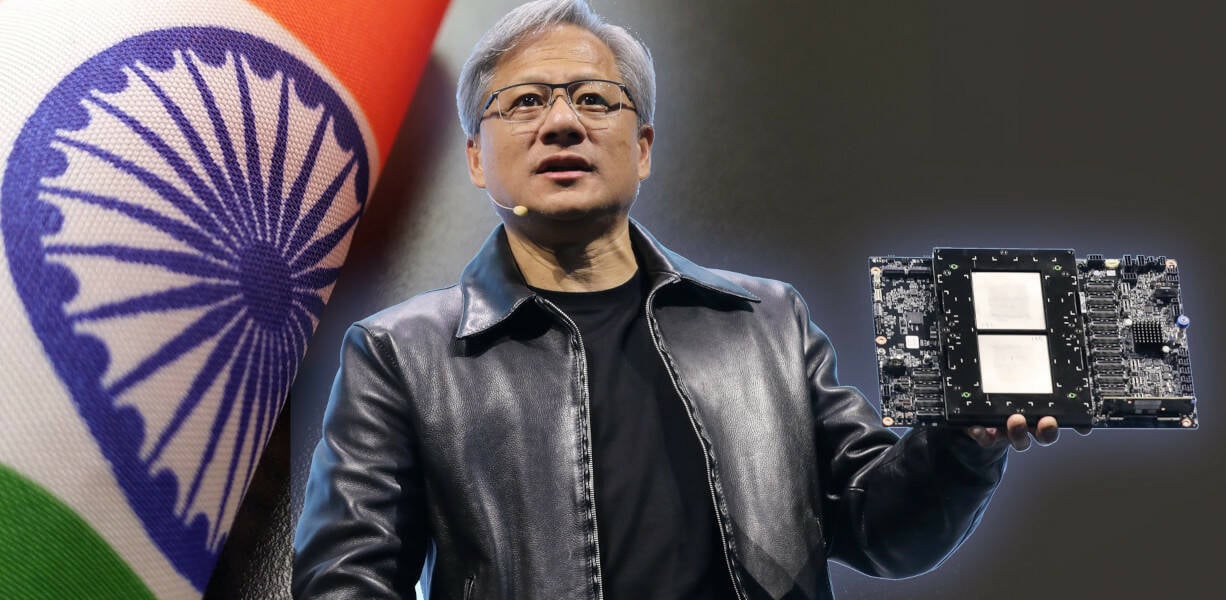Nvidia Can't Sell Its Best Chips To China, But India Is More Than Happy To Take Them

Nvidia may not be able to sell its top-specced GPUs in China, but across the border in India, datacenter operators are buying up tens of thousands of accelerators to bolster their AI capabilities.
Indian bit-barn biz Yotta, for instance, now plans to deploy 32,000 Nvidia H100 and H200 GPUs by 2025. In an interview on Thursday, Yotta CEO Sunil Gupta said the deal was worth roughly $1 billion. About 16,000 of those GPUs are slated to be delivered this July and will be deployed at an AI-focused datacenter in the Gujarat International Finance Tec-City, which is due to open in March.
Yotta forecasts machine-learning adoption in the country will hit $14 billion by the end of the decade. However, this will only be possible with the right infrastructure, Gupta said. In other words, the future of AI in India depends on American made accelerators — namely Nvidia's accelerators.
Yotta is not the only Indian firm that Nvidia has struck deals with in recent months. Last September Nv announced a partnership with India's Reliance Industries and Tata Group to expand the availability of AI services in the country.
Reliance — a multinational with hands in everything from textiles, energy and petrochemicals to telecommunications and media — plans to deploy large volumes of Nvidia accelerators to train foundation large language models for India's many languages and dialects.
- Chinese company's rocket debut makes waves by launching from the sea
- US Navy sailor swaps sea for cell after accepting bribes from Chinese snoops
- Nvidia readies downgraded chips for China, but will anyone want to buy them?
- Nvidia slowed RTX 4090 GPU by 11 percent, to make it 100 percent legal for export to China
These accelerators include Nvidia's GH200 Superchips, which will be deployed in datacenters managed by Reliance's telecommunications wing Jio. Meanwhile, Tata Group is working with Nvidia to build an AI supercomputer using the GH200, which will power a variety of new cloud services.
However, it's not clear just how many GPUs Tata or Reliance have committed to deploy so far.
Filling the gap
Nvidia's growing influence in India is important as its ability to sell high-end datacenter GPUs in China dwindles.
Nvidia was slated to sell $5 billion A800 and H800 accelerators to Chinese web giants between 2023 and 2024 before US export restrictions, announced in October, effectively barred the sale of most datacenter GPUs bound for China.
The chip house has since responded by developing a trio of export-compliant accelerators that limbo-dance just under the export limits set by the Biden administration, but not before attracting the ire of US Commerce Secretary Gina Raimondo.
By the sounds of things, Nvidia is going to be allowed to move ahead with its latest cut-down chips for the Middle Kingdom market. Whether Chinese buyers are still interested is another matter entirely. As we reported earlier this week, Chinese firms aren't exactly keen on the scaled-back chips.
Throughout all of this, the Nvidia finance team has remained optimistic that the sheer demand for AI accelerators will offset any potential losses in China. "Given the strength of demand for our products worldwide, we do not anticipate that the additional restrictions will have a near-term meaningful impact on our financial results," the chip biz said in October.
We expect to find out just how well the corporation's fortunes are fairing when it presents its fourth-quarter revenues next month. ®
From Chip War To Cloud War: The Next Frontier In Global Tech Competition
The global chip war, characterized by intense competition among nations and corporations for supremacy in semiconductor ... Read more
The High Stakes Of Tech Regulation: Security Risks And Market Dynamics
The influence of tech giants in the global economy continues to grow, raising crucial questions about how to balance sec... Read more
The Tyranny Of Instagram Interiors: Why It's Time To Break Free From Algorithm-Driven Aesthetics
Instagram has become a dominant force in shaping interior design trends, offering a seemingly endless stream of inspirat... Read more
The Data Crunch In AI: Strategies For Sustainability
Exploring solutions to the imminent exhaustion of internet data for AI training.As the artificial intelligence (AI) indu... Read more
Google Abandons Four-Year Effort To Remove Cookies From Chrome Browser
After four years of dedicated effort, Google has decided to abandon its plan to remove third-party cookies from its Chro... Read more
LinkedIn Embraces AI And Gamification To Drive User Engagement And Revenue
In an effort to tackle slowing revenue growth and enhance user engagement, LinkedIn is turning to artificial intelligenc... Read more

